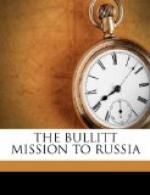in it all their lives from childhood up.
They could find their way in it. And now they
can remember how it was, and they sigh for the
old ways. The rich emigres knew whom to
see to bribe for a verdict, a safe-conduct, or
a concession; and the poor, in their hunger,
think now how it would be to go down to the market
and haggle, and bargain, from one booth to another,
making their daily purchases, reckoning up their
defeats and victories over the traders.
And they did get food then. And now—it
is all gone. They have destroyed all this, and
having destroyed it they were lost, strangers
in their own land.
This tragedy of transition
was anticipated by the leaders of
the revolution, and
the present needs were prepared for in
the plans laid for reconstruction.
Lenin has imagination. He is an idealist, but he is a scholar, too, and a very grim realist. Lenin was a statistician by profession. He had long been trying to foresee the future of society under socialism, and he had marked down definitely the resources, the machinery, and the institutions existing under the old order, which could be used in the new. There was the old Russian communal land system, passing, but standing in spots with its peasants accustomed to it. That was to be revived; it is his solution of the problem of the great estates. They are not to be broken up, but worked by the peasants in common. Then there was the great Russian Cooperative (trading) Society, with its 11,000,000 families before the war; now with 17,000,000 members. He kept that. There was a conflict; it was in bourgeoise hands but it was an essential part of the projected system of distribution, so Lenin compromised and communist Russia has it. He had the railroads, telegraph, telephone already; the workers seized the factories, the local Soviets the mines; the All-Russian Soviet, the banks. The new government set up shops—one in each neighborhood—to dole out not for money, but on work tickets, whatever food, fuel, and clothing this complete government monopoly had to distribute. No bargaining, no display, no advertising, and no speculation. Everything one has earned by labor the right to buy at the cooperative and soviet shops is at a fixed, low price, at the established (too small.) profit—to the government or to the members of the cooperative.
Money is to be abolished gradually. It does not count much now. Private capital has been confiscated, most of the rich have left Russia, but there are still many people there who have hidden away money or valuables, and live on them without working. They can buy food and even luxuries, but only illegally from peasants and speculators at the risk of punishment and very high prices. They can buy, also, at the government stores, at the low prices, but they can get only their share there, and only on their class or work tickets. The class arrangement, though transitory and temporary—the aim




